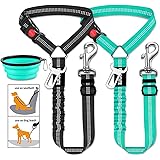Road trips can be a fun and exciting way to explore new places, see beautiful landscapes, and create lasting memories with friends and family. However, without proper planning, road trips can quickly turn into a disaster. To ensure a successful and stress-free road trip, follow these tips for planning your adventure.
1. Plan your route in advance: Before hitting the road, map out your route and determine your stops along the way. Consider factors such as driving time, distance between destinations, and potential road closures or construction. Having a clear plan will help you avoid getting lost and wasting time trying to figure out where to go.
2. Check the weather forecast: Weather can have a significant impact on your road trip experience, so it’s essential to stay informed about the forecast for each destination on your itinerary. Be prepared for inclement weather by packing appropriate clothing, food, and supplies.
3. Make a packing list: Create a packing list to ensure you have everything you need for your road trip. This includes essentials such as clothes, toiletries, snacks, water, maps, GPS, phone charger, first aid kit, and any other necessary items. Don’t forget to pack emergency supplies, such as a flashlight, batteries, and a spare tire.
4. Maintain your vehicle: Before embarking on a road trip, make sure your vehicle is in good condition. Check the oil, tires, brakes, and other essential systems to ensure they are functioning properly. It’s also a good idea to have your car serviced by a mechanic to address any potential issues before hitting the road.
5. Consider accommodations: If your road trip involves overnight stays, book accommodations in advance to ensure you have a place to rest at the end of a long day of driving. Research hotels, motels, campgrounds, or Airbnb options along your route and make reservations as needed.
6. Budget for expenses: Road trips can be costly, so it’s essential to create a budget and plan for expenses such as gas, food, accommodations, attractions, and souvenirs. Consider using a travel budgeting app to track your spending and stay on track with your financial goals.
7. Stay flexible: While having a plan is important, it’s also essential to be flexible and willing to adapt to unexpected changes or detours along the way. Embrace the spontaneity of road trips and be open to new experiences and opportunities that may arise during your journey.
By following these tips for successful road trip planning, you can avoid potential disasters and ensure a memorable and enjoyable travel experience. Remember to stay safe, be prepared, and have fun exploring the open road!










